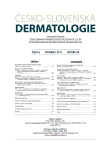Prognostic Significance of Osteoprotegerin and Osteopontin in Malignant Melanoma
Authors:
Inka Třešková 1
; O. Topolčan 2; J. Vrzalová 2; K. Pizinger 3
Authors‘ workplace:
Oddělení plastické chirurgie, FN Plzeň
primář MUDr. Vlastimil Bursa
1; Imunoanalytická laboratoř, FN Plzeň
vedoucí prof. MUDr. Ondřej Topolčan, CSc.
2; Dermatovenerologická klinika, FN Plzeň
přednosta prof. MUDr. Karel Pizinger, CSc.
3
Published in:
Čes-slov Derm, 88, 2013, No. 6, p. 280-284
Category:
Clinical and laboratory Research
Overview
Aim:
The aim of our study was to evaluate the dynamics of biomarkers osteoprotegerin and osteopontin and their relationship to prognosis of patients with malignant melanoma during the period from 2009 to 2012.
Method:
We evaluated a group of patients with malignant melanoma (n = 77) and control group without cancer (n = 34). In these groups we evaluated the serum levels of osteoprotegerin and osteopontin using xMAP technology.
Results:
There was a statistically significant correlation between serum osteopontin and lymph node involvement (p < 0.01) and the positivity/negativity of the sentinel lymph nodes (p < 0.03). Elevated serum levels of osteopontin has been found in patients with advanced disease in comparison to patients with primary melanoma (p < 0.02). We found elevated serum levels of osteoprotegerin in the group of patients with disease progression compared to the group in remission (p < 0.01). In the group of patients with malignant melanoma we found higher serum levels of osteoprotegerin (p < 0.001) and osteopontin (p < 0.0008) in comparison with the control group. Sensitivity of osteoprotegerin was 39.21% at 93% specificity and ostepontin 9.8% at 93% specificity.
Conclusion:
This study shows osteopontin and osteoprotegerin to be useful biomarkers in evaluating biological activity of malignant melanoma. Validation of our current results in a larger group of patients is needed.
Key words:
malignant melanoma – biomarkers – osteoprotegerin – osteopontin – multiplex analysis
Sources
1. BARAK, V., FRENKEL, S., KALICKMAN, I. et al. Serum markers to detect metastatic uveal melanoma. Anticancer Res., 2007, Jul-Aug, 27 (4A), p. 1897–1900.
2. BANFALVI, T., BOLDISZAR, M., GERGYE, M. et al. Comparison of prognostic significance of serum 5-S-Cysteinyldopa, LDH and S-100B protein in Stage III-IV malignant melanoma. Pathol. Oncol. Res., 2002, 8 (3), p. 183–187.
3. HOUSER, B. Bio-Rad’s Bio-Plex® suspension array system, xMAP technology overview. Arch. Physiol. Biochem., 2012, Oct, 118 (4), p. 192–196.
4. KADKOL, S. S., LIN, A. Y., BARAK, V. et al. Osteopontin expression and serum levels in metastatic uveal melanoma – a pilot study. Invest Ophthalmol Vis Sci., 2006, Mar, 47 (3), p. 802–806.
5. KRAJSOVÁ, I. Kožní melanom: diagnostika, léčba a pooperační sledování. Čes-slov Derm., 87, 2012, No. 5, p. 163–174.
6. LÁZÁR-MOLNÁR, E., HEGYESI, H., TÓTH, S. et al. Autocrine and paracrine regulation by cytokines and growth factors in melanoma. Cytokine, 2000, Jun, 12 (6), p. 547–554.
7. LISKA, V., HOLUBEC, L. J. R., TRESKA, V. et al. Evaluation of tumour markers as differential diagnostic tool in patients with suspicion of liver metastases from breast cancer. Anticancer Res., 2011, Apr, 31 (4), p. 1447–1451.
8. MALATI, T. Tumor markers: an overview. Indian. J. Clin. Biochem., 2007, Sep, 22 (2), p. 17–31.
9. PALMER, S. V., ERICKSON, L. A., ICHETOVKIN, I. et al. Circulating serologic and molecular biomarkers in malignant melanoma. Mayo Clin Proc., 2011, Oct, 86 (10), p. 981–90.
10. RANGEL, J., NOSRATI, M., TORABIAN, S. et al. Osteopontin as a molecular prognostic marker for melanoma. Cancer, 2008, Jan 1;112 (1), p. 144–150.
11. REID, P., HOLEN, I. Pathophysiological roles of osteoprotegerin. Eur. J. Cell. Biol., 2009 Jan, 88 (1), p. 1–17.
12. SIMONET, W. S., LACEY, D. L., DUNSTAN, C. R. et al. Osteoprotegerin: a novel secreted protein involved in the regulation of bone density. Cell, 1997, Apr 18. 89 (2), p. 309–319.
13. SPATZ, A., STOCK, N., BATIST, G. et al. The biology of melanoma prognostic factors. Discov. Med., 2010, Jul, 10 (50), p. 87–93.
14. TSUKAMOTO, S., ISHIKAWA, T., IIDA, S. et al. Clinical significance of osteoprotegerin expression in human colorectal cancer. Clin. Cancer Res., 2011, Apr 15,1 7 (8), p. 2444–2450.
15. VEREECKEN, P., CORNELIS, F., VAN BAREN, N. et al. A synopsis of serum biomarkers in cutaneous melanoma patients. Dermatol. Res. Pract., 2012, p. 260–264.
16. WANG, K. X., DENHARDT, D. T. Osteopontin: role in immune regulation and stress responses. Cytokine Growth Factor Rev., 2008, Oct-Dec, 19 (5–6), p. 333–345.
17. WEBER, G. F., LETT, G. S., HAUBEIN, N. C. Osteopontin is a marker for cancer agressiveness and patient survival. Br. J. Cancer, 2010, Sep 7, 103 (6), p. 861–869.
18. YEUNG, R. S. Osteoprotegerin/osteoprotegerin ligand family: Role in inflammation and bone loss. J. Rheumatol., 2004, May, 31 (5), p. 844–846.
Labels
Dermatology & STDs Paediatric dermatology & STDsArticle was published in
Czech-Slovak Dermatology

2013 Issue 6
Most read in this issue
- Granuloma Annulare
- Hand Foot and Mouth Disease
- Atrophodermia Vermiculata in a Boy Suffering from Marfan’s Syndrome
- Prognostic Significance of Osteoprotegerin and Osteopontin in Malignant Melanoma
